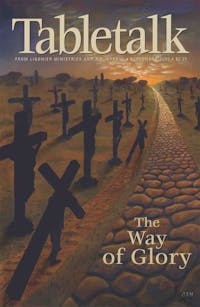
Request your free, three-month trial to Tabletalk magazine. You’ll receive the print issue monthly and gain immediate digital access to decades of archives. This trial is risk-free. No credit card required.
Try Tabletalk NowAlready receive Tabletalk magazine every month?
Verify your email address to gain unlimited access.
For shining examples of believers suffering horrendous persecutions even unto the loss of their lives, and yet approaching martyrdom with overflowing joy, the Scottish Covenanters may well be unrivaled. And Jock Purves’ little book Fair Sunshine: Character Studies of the Scottish Covenanters, has few if any modern peers when it comes to telling these martyrs’stories.
Make no mistake—this is not a historical account of the Scottish Covenanting movement. Purves, himself a Scotsman, wrote these sketches nearly a half-century ago for Scot readers, so a certain understanding of the history is assumed. The book does include a chronological summary of major events and an epilogue titled “An outline of Scottish ‘Covenant History’ in the 17th century,” but these addenda are too brief to fully explain the complicated history involved. Simply put, Purves did not set out to write a historical document. His book contains exactly what the title promises—character studies.
But what studies these are! Again and again Purves tells of ordinary men—and women—facing the most gruesome trials for their refusal to accept the English kings’ claim of sovereignty over the Scottish church in the seventeenth century. “ ‘The bleeding remnant’ would obey God rather than men, and live, and the if need be, for the Crown Rights of their Redeemer,” Purves writes. Rather than tolerate the imposition of episcopal church government upon their beloved “kirk,” they were willing to become fugitives, suffer banishment, lose their material possessions, undergo the most painful physical suffering, and even face death, counting it their highest privilege to suffer for Christ. By God’s grace, many of the actions and the very words of the condemned Covenanters were recorded and preserved, to be collected here by Purves. Therein lies the great value of this little book. The author puts it well: “As the horrors are bestial and brutal, so are the testimonies tender and spirit quickening.”
The horrors were indeed “bestial.” Writes Purves: “Long is the roll of the names of the martyrs—the lashed to the hooks, the burned by the match, the redhot iron branded, the starved to death, the bone mangled and crushed, the earclipped, the banished, the wounded and torn by bullet and knife.” Again and again, Purves tells of Covenanters undergoing excruciatingtorture for their refusal to say, “God save the king.” For their stand, some were sold into slavery in the New World. Others suffered the violent amputation of limbs. Of the many who were condemned to die, most were executed by hanging in the Edinburgh Grassmarket. However, their persecutors found many other ways to put them to death. For instance, David Hackston was disemboweled on the scaffold and his heart removed by his executioner. And Margaret MacLachlan and Margaret Wilson were tied to stakes at low tide, to drown as the waters rose.
But for each execution Purves relates, he records the martyr’s testimony that God had taken away all fear of death, and filled him with humble gratitude for the privilege of dying for the faith and with eager anticipation of the joys awaiting beyond the gallows. Let their words speak for them:
Hugh MacKail, as he climbed the ladder to his scaffold, said, “Each step is a degree nearer heaven.” His last words were full of faith: “Now, I leave off to speak any more to creatures, and turn my speech to thee, O Lord. Now I begin my intercourse with God which shall never be broken off. Farewell, father and mother, friends and relations! Farewell, the world and all delights! Farewell, meat and drink! Farewell, sun, moon and stars! Welcome, God and Father! Welcome, sweet Lord Jesus, Mediator of the New Covenant! Welcome blessed Spirit of grace, God of all consolation! Welcome, glory! Welcome, eternal life! Welcome, death!” John Dick displayed the same eagerness. “I am come here this day, and would not change my lot with the greatest in the world,” he said. “I lay down my life willingly and cheerfully for Christ and His cause.”
Donald Cargill declared: “This is the most joyful day that ever I saw in my pilgrimage on earth. My joy is now begun which I see shall never be interrupted.”
Archibald Allison was joyous too. “For my part I am glad that He calls me away after this manner, for which I desire with my soul to bless Him for His kindness to me in taking this method, and this way, with such a wretched sinner as I am, who deserves nothing, nothing but wrath and only wrath,” he said.
Finally, Archibald Campbell triumphantly summed up the martyrs’ experience in words that Purves borrows for his title: “What shall I say in this great day of the Lord, wherein in the midst of a cloud, I have found a fair sunshine.”
Fair Sunshine is good-for-the-soul reading. It is published by Banner of Truth.
